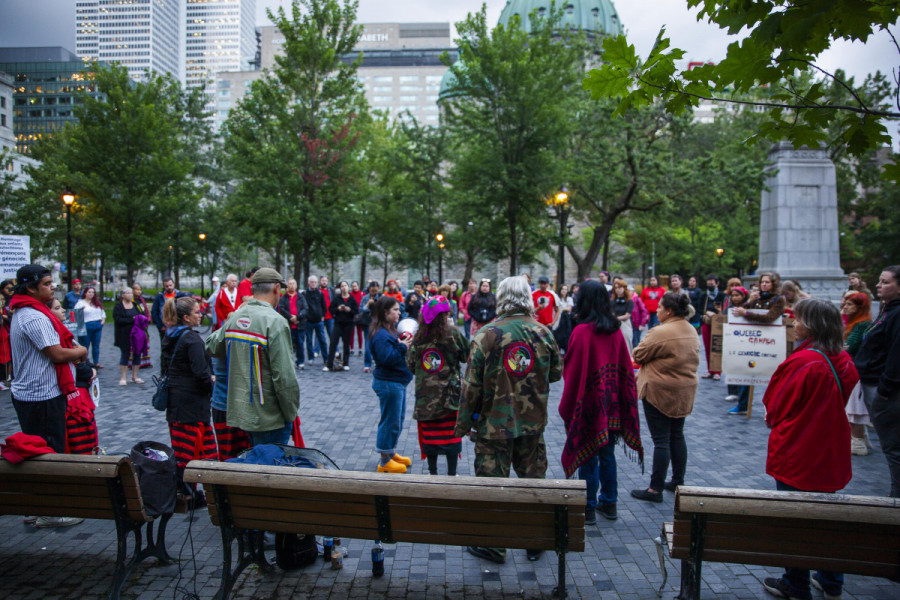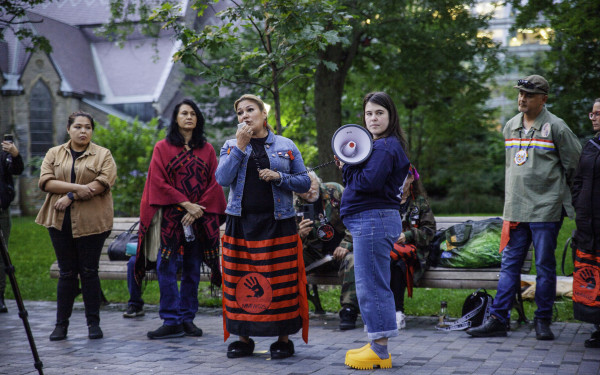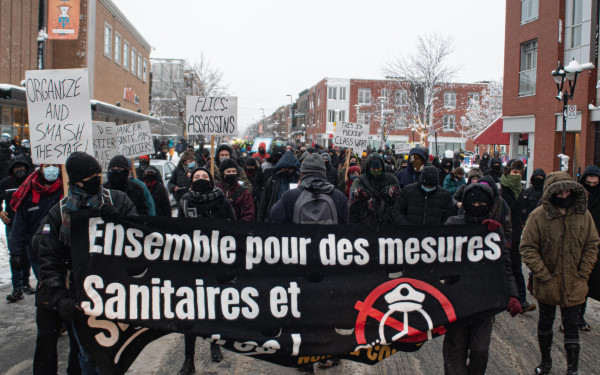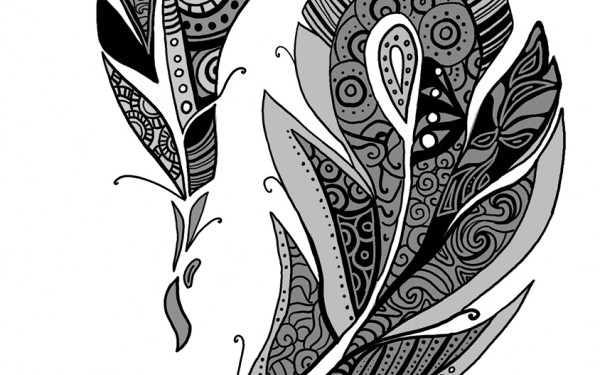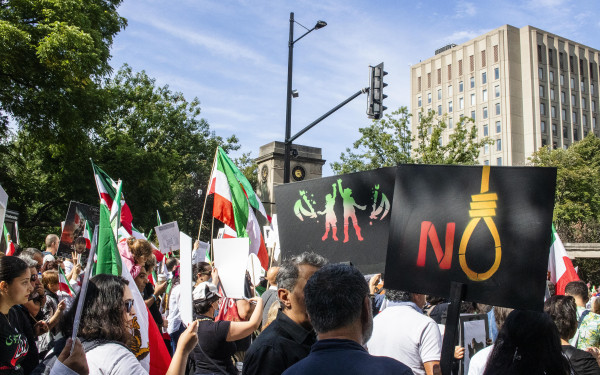Montrealers stand in solidarity with the Search the Landfill movement
Families, advocates and allies call for Manitoba government to search Winnipeg landfills for Indigenous murder victims
In light of the National day of action for missing and murdered indigenous women, girls & gender-diverse people, vigils occurred across Canada on Sept. 18 in support of the Search the Landfill movement. Approximately 80 people, including victims’ family members, supporters and allies gathered at Place du Canada in Montreal.
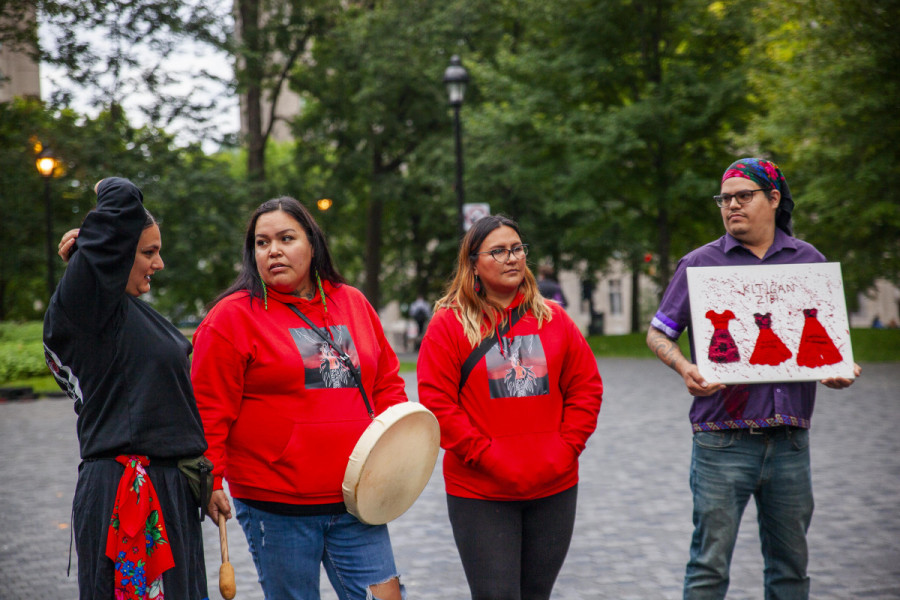
The event began with smudging and a performance by the Travelling Spirit drum group. Crowds gathered with the family and speakers as attendees held signs reading “Search the Landfill,” “Every Child Matters” and “Justice for Our Sisters.”
The movement to search the landfill began ten months ago in Manitoba. On Dec. 18, 2022, five family members took matters into their own hands following the unresolved murders of their relatives.
In May 2022, Jeremy Skibicki killed Morgan Harris and Mercedes Myran of Long Plain First Nation. Police believe their bodies were dumped in the Prairie Green landfill. One of Skibicki’s former victims, Rebecca Cantois, was found in the Brady Road landfill. Another one of his victims remains unidentified and has been given the name “Buffalo woman.”
Cambria Harris, the daughter of Morgan Harris, was in attendance at Monday’s vigil in Montreal. She pleaded to the crowd, emphasizing the disregard from Canadian authorities towards missing and murdered Indigenous victims. “Non-Indigenous people get searches,” she said in reference to a non-Indigenous Ontario man whose remains were found successfully following a landfill search.
According to Harris, she continues to see garbage dumped in the landfill where her mother’s remains are still missing. She also explained to the crowd that Winnipeg is the epicentre of the missing and murdered Indigenous women, girls, and gender-diverse people (MMIWG2S+) crisis.
“We’re joining forces. We’re standing in solidarity with folks across Canada who are also calling for an end to the broader issue of all forms of violence against Indigenous women and girls,” said Iskweu Project member Laura Aguiar. “We would like to see an immediate search of the landfill.”
“It is outrageous that they are not letting anyone go in to search the landfill, and it is incredibly devastating for the families,” explained Na’kuset, executive director of the Native Women’s Shelter of Montreal. “When you have a large group that is all in solidarity, that’s what changes things. The goal is that tomorrow the premier watches the news and gets so embarrassed that everyone is calling her out […] We have to literally shame people into action.”
Speakers expressed their dissatisfaction with Manitoba Premier Heather Stefanson, who has spoken publicly about the province’s decision to not search the landfill. “Kick her out,” activist Ellen Gabriel exclaimed in reference to the upcoming provincial election next month.
Mi’kmaq drummer Megan Leinen, who was there with the drumming group the Powwow Rangers, attended the event in solidarity. “It’s like something that directly affects me, I have two cousins who are missing,” she said. “Everyone knows somebody. I hope that more people will be aware.”
For attendees and families of the victims, the continued insistence to not search the landfill by the Manitoba government demonstrates the continuance of colonial genocide in Canada.

While the government refuses to safely search the landfills, the families of Harris and Myran lack closure and continue to mourn.
This issue, however, extends beyond Manitoba and the call to search the landfill. The National Inquiry into Missing and Murdered Indigenous Women and Girls contained extensive testimony from family members who, like Myran and Harris, had lost a loved one and experienced injustice.
The inquiry details a 23-year-old Cree woman who died in 1991 after being beaten by community members in Val D’Or, Que. No charges were laid and the case was closed. It also describes the story of a 17-year-old Innu girl who died in 2011 after not returning home after a night out. Her cause of death is still unknown.
These are only a few stories among thousands of others across Canada—of Indigenous women, girls and gender-diverse people being abused, abducted, and killed–without justice being served.
In 2019, Prime Minister Justin Trudeau accepted the inquiry, which “reveals that persistent and deliberate human and Indigenous rights violations and abuses are the root cause behind Canada’s staggering rates of violence against Indigenous women, girls and LGBTQIA2S+ people” and outlines 231 calls for justice, which detail 18 areas in need of reform including education, justice and health.
As injustice persists, the memories of Myran, Harris, and the thousands of Missing and Murdered Indigenous women, girls and gender-diverse people weigh on the hearts of many.
While the Manitoba government and police have stalled the pursuit of justice, loved ones and advocates stay persistent and resilient.
Protesters in Montreal raised their voice against the injustice caused by the authorities in Manitoba and demanded that they follow the MMIWG2S+ National inquiry to condone the abuses committed by the Canadian state, which represents genocide against Indigenous women, girls, and LGBTQIA2S+ people.
This article originally appeared in Volume 44, Issue 2, published September 19, 2023.

